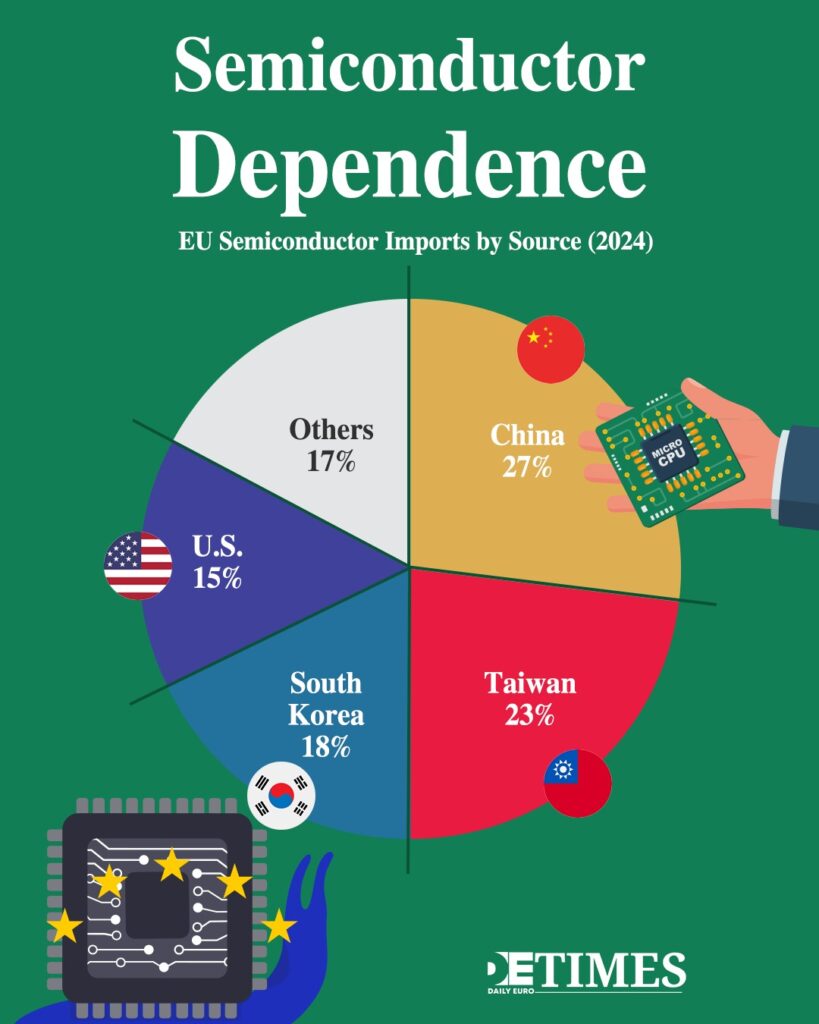The European Union plans to require Chinese companies to share technology with European firms to gain permission to operate within the bloc.
The announcement comes just days after Amsterdam used emergency powers for the first time to take control of Nexperia, a chip maker owned by Chinese parent Wingtech Technology.
Years of Washington pushing TikTok’s forced sale to US interests over security concerns set the stage. Europe now adopts methods once met with criticism.
Mimicking the Manual
Trade Commissioner Maros Sefcovic said foreign investment is welcome “if it is real investment.” His words echo longstanding Chinese rules that require foreign companies to share technology before entering mainland markets.
The World Trade Organization has challenged such policies for years. Brussels itself filed WTO cases against China over restrictions on foreign investment through technology transfer mandates. That dispute remains unresolved.
This shift raises questions about consistency. Governments either back open technology exchange or they do not.
Emergency Powers, Permanent Damage
The Netherlands invoked a post-WWII law to seize control of Nexperia. Officials claimed this step aimed to ensure products from the company stayed available during crises.
This reasoning seems solid until examined closely. Nexperia produces common semiconductors, parts provided by many companies all across Europe, the U.S., and Asia.
The Dutch government appointed an independent figure to replace CEO Zhang Xuezheng and oversee the company’s management. Beijing responded as expected. China blocked exports from Nexperia’s plants in Asia.
Now control has diminished on both sides.
The Productivity Problem
Rules set to take effect in November would technically cover all non-EU companies, but the main focus lies on preventing Chinese manufacturing from overpowering European industries. This reveals a deeper concern. Europe fears slipping behind economically.
A strong manufacturing base is built over decades with investments, skilled workers, and well-established supply chains. Pressured technology sharing does not create such foundations overnight. Companies receiving technology under duress often lack the capacity to exploit it fully.
History offers a lesson. During the Cold War period, Soviet industrial espionage stole Western designs but never bridged productivity gaps or delivered goods people wanted. Economic strength develops from systems that foster innovation rather than forced redistribution.

Capital Flows Both Ways
The proposals treat investment as a zero-sum game. Money flows in, so technology must flow out. This perspective overlooks how global business really operates.
Chinese firms invest in Europe to access skilled labour, efficient logistics, and nearby customers. European companies invest in Asia to cut costs and speed up production. Both sides gain from being interconnected.
Forced technology sharing breaks the trust partnerships need. Companies usually respond by shifting investments elsewhere. Although the new rules aim to stop Chinese manufacturing from crowding out local business, protectionism often weakens the sectors it seeks to protect.
Security or Control
Authorities justify these moves on security grounds. Protecting data, safeguarding supply chains, and preserving technological independence sound responsible. Yet actual steps taken paint a different picture.
Nexperia reported a cyberattack in April 2024 that compromised confidential data including customer details and chip designs. Such breaches raise valid concerns. Seizing a company does not address those risks. Stronger cybersecurity standards would.
If Brussels truly feared technology leaking to Beijing, tighter export controls and comprehensive audits would offer solutions. Instead, the bloc demands technology transfers inbound. This contradiction signals economic goals hidden behind security language.
Precedent and Consequences
These policies create risky precedents. Once European authorities demand technology sharing from Chinese investors, countries like India, Brazil, or Indonesia might seek the same from European firms.
Pharmaceutical firms working in developing markets could face similar demands. Automotive manufacturers expanding abroad might need to share electric vehicle designs. Software developers may have to hand over source code.
Such tit-for-tat protectionism accelerates as nations adopt measures triggering retaliation. The global trade system that lifted billions out of poverty over forty years relies on agreements that limit these pressures.
A Different Path
Europe needs stronger technological leadership and industrial capacity. Forced technology sharing cannot deliver either.
Investing in research centres, technical education, and startups stimulates innovation that cannot be taken or copied. Competition laws preventing monopolies and encouraging new players keep markets dynamic. Infrastructure improvements that reduce business costs help attract investments.
Such efforts require patience and ongoing funding. They lack the instant appeal of extracting technology from foreign firms but prove effective.
Brussels stands at a crossroads: build strength through competition or demand success through coercion. The first route challenges but sustains growth. The second leads to failure and damages the system that created prosperity.
Keep up with Daily Euro Times for more updates!
Read also:
Europeans Want a ‘Secure, Easy-to-Use, and Free Digital Euro
America First? TikTok Gives Control to Israeli Tech Company
Trade, Tech, and Tension: Storm Clouds






